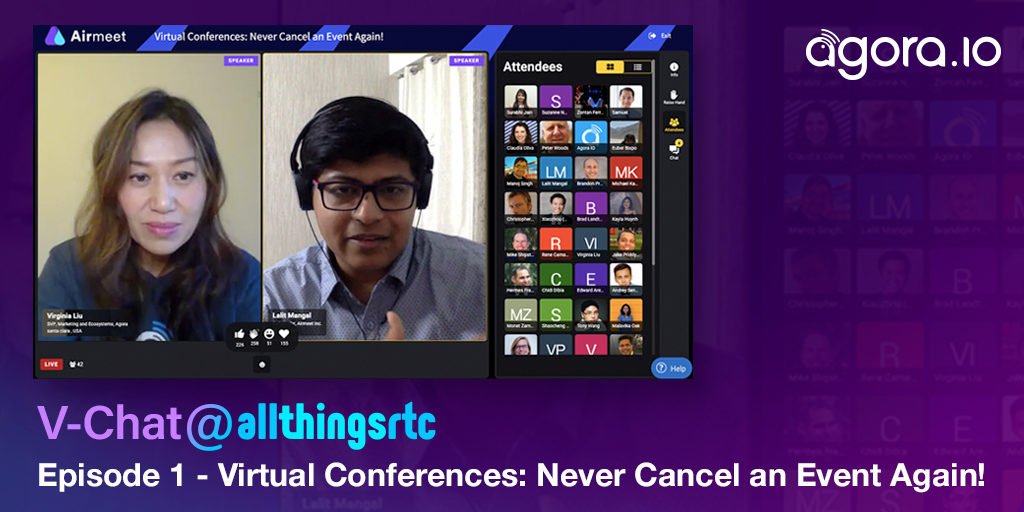
V-Chat@AllThingsRTC Blog Episode 1 – Virtual Conferences: Never Cancel an Event Again!
We just launched our new V-Chat@AllThingsRTC series, a monthly fireside chat that brings our community together to discover new industry leaders and connect with entrepreneurs who are collectively changing the way we interact through innovations in real-time communications. Each month, we will showcase a great lineup of interviews, panel sessions, developer technical webinars and other interactive RTC digital series – all leading up to our main AllThingsRTC conference in San Francisco.
Our host is Virginia Liu, Agora’s SVP of Marketing and Ecosystems. As physical events cancel all over the world, we look at the future and the new norm is around Virtual Conferences and Events. In our first episode, Virginia talks with Lalit Mangal, a successful serial entrepreneur and co-founder of AirMeet.com, an innovative, out-of-the-box, virtual conference solution. He was previously the co-founder and chief product officer at CommonFloor.com, one of India’s leading real estate portals, which got acquired by a larger horizontal classifieds player in India in 2017.
AirMeet is a venture-backed startup founded by Lalit Mangal, Vinay Jaasti and Manoj Singh, with prominent investors like Accel Partners. It’s also a member of the Agora for Startups program, working with us since October 2019. Virginia discussed AirMeet’s origins, what makes it unique, and how it’s already making an impact on the world.
Here are some highlights from the interview:
What is AirMeet and what does it do?
“AirMeet is an all-in-one platform for community managers to host engaging remote meetups and conferences, which feel as real and authentic like in-person events.”
Why did you create AirMeet?
“We are passionate about remote work and how that inevitable trend is going to change the way we work, live, and grow as professionals. We wanted knowledge professionals to feel more connected with the global communities they are part of, irrespective of where they live.”
As many parts of the world are in lock-down mode to slow the spread of COVID-19, events are either being canceled or moved to online. How has this impacted AirMeet?
“The unfortunate global lockdown has brought us in limelight and people are using AirMeet for many new use cases which we had never imagined. Other than community meetups and conferences, there are companies doing their all-hands events on AirMeet, homeowners associations doing their general body meetings on AirMeet. Artists are doing jamming sessions on AirMeet for their fan base.”
Until recently, virtual events were still just a small fraction of physical events and meetups. What prohibited the adoption of virtual events and how is AirMeet solving that?
“Virtual events till now have been focused on content delivery and not on rich interactions among participants. For interactions, people would organize physical events. AirMeet is the world’s first platform which brings rich interactions and networking capability to virtual events.
You chose Agora for the underlying voice and video technology powering AirMeet. Why?
- Extensive developer support and documentation
- The Agora Startup Program
- Scalable platform
How do you think virtual events and meetups will look in the next 5-10 years?
“In 5-10 years…there would be global-scale virtual events happening in VR with personalized schedules and experiences with artificial intelligence…Events which have a significant ‘experiential’ element to it. For example, music concerts, celebrity fundraisers, etc, would continue to be in physical format. But almost every event which has information, knowledge, and interactions at its core would remain remote/virtual.”
What tips would you offer to those who want to host a virtual event?
- Curation of topics and speakers is very important.
- Pick the timing which would ensure maximum live participation.
- Use platforms (like AirMeet) that offer an all-in-one solution, from landing pages and pre-event engagement to a great live event experience to post-event engagement.
Lalit participated in a Q&A session, with broadcast audience members coming on the chat:
When you struggle with poor connectivity or an older computer, how does AirMeet help with WebRTC reliability?
Lalit mentioned how AirMeet would create a 30-second delay version of the video feed to give people other options beyond the live video and would also stitch together audio/video feeds to create a more seamless experience.
How would AirMeet compare to other competitive video-hosting products?
“AirMeet is not about video hosting. We are mostly about interactions during events.” Lalit specified that AirMeet could be used as the application layer for virtual hosting with a variety of different infrastructures and interfaces.
What’s the plan to expand AirMeet to mobile platforms?
“Right now, we believe that events are a monthly use-case. As the number of events and event managers increases, so will the need for mobile usage.” Lalit discussed how the demand is growing for this type of application, and they certainly expect more app downloads as time goes on.”
Lalit also fielded some more fun and quirky questions, such as:
What was the biggest challenge you came across when you developed AirMeet?
“The biggest challenge when we started AirMeet was to actually convince people that Airmeet is a viable product idea. Many people were not really convinced that people would like to meet remotely, but now we have passed that. Our current, biggest challenge is to support varied client environments. Chrome is probably one of the most WebRTC friendly browsers, not all browsers are very supportive in terms of CODEC, so supporting varied client environments is our current biggest challenge.”
What is the maximum number of attendees and panelist in a session; do you have any built in sponsorable assets? For in-person events, the revenue stream is actually sponsorship. How do you solve that for event organizers?
“There’s a theoretical limit of one million attendees, that is such a large number. We have tested out for 10,000. You can host 100,000 very easily. On the session, for a great experience, we would recommend not going beyond 10 panelists; you could have 16 which is also the recommended WebRTC limit. For sponsorable assets, very soon on the social lounge, we will launch ‘open table’ where the current limit of four person to a table will be removed. With open table, there will be no limit on joining a table, and some of these tables could be sponsored. For instance, Agora might have a table on the open table and whoever is interested in Agora could join the open table and join the discussion. For instance, Agora might have a table on the open table and whoever is interested in Agora could join the open table and join the discussion.
There will also be full customizability of look and feel. For instance, before the session starts, we could play and audio video of the sponsor. These are all in the roadmap and will be launching soon.”
Many thanks to Lalit and his co-founders for participating and also for joining us in our live social lounge session after the show.
To watch the complete first episode of V-Chat@AllThingsRTC, visit our YouTube channel here.

